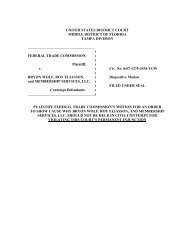Complaint Counsel's Post Trial Brief - Federal Trade Commission
Complaint Counsel's Post Trial Brief - Federal Trade Commission
Complaint Counsel's Post Trial Brief - Federal Trade Commission
Create successful ePaper yourself
Turn your PDF publications into a flip-book with our unique Google optimized e-Paper software.
ingredients -- ginseng, shark carilage, bromelain, and boron - appear in the other three DCO<br />
Products discussed above and were not supported by clinical data for cancer treatment. CCPF<br />
~236.<br />
Dr. Miler also stated that "absolutely no data" supports the claim that BioMixx is used to<br />
heal the destrctive effects of radiation and chemotherapy treatments. CCPF ~ 237.<br />
c. Respondents' Purported Experts Did Not Possess Any<br />
Information Substantiatig Respondents' Claims and<br />
Reinforced Dr. Miler's Conclusion that No Competent and<br />
Reliable Scientic Evidence Exists to Support Respondents'<br />
Claims<br />
Respondents submitted four purorted expers to support their case: James Duke, Ph.D.<br />
("Duke"), Jim Dews ("Dews"), Sally LaMont ("LaMont"), and Rustu Roy, Ph.D. ("Roy").<br />
Respondents' purorted expers, none of whom is a medical doctor or cancer specialist, failed to<br />
provide any evidence to controver Dr. Miler's conclusions. CCPF W 239-43,296,314,324,<br />
329-31. Respondents' experts did not provide any evidence controvering Dr. Miler's<br />
conclusion that Respondents do not possess any competent and reliable scientific evidence to<br />
substantiate the representations at issue in the Complait.<br />
In fact, Respondents' expers reports, deposition testimony, and tral testimony reinforce<br />
Dr. Miler's conclusions regarding what constitutes competent and reliable scientific evidence as<br />
well as the absence of any competent and reliable scientific evidence to support Respondents'<br />
representations. For example, consistent with Dr. Miler's view on the need for controlled<br />
clinical studies, Duke stated that "as a matter of science," he did not believe that the herbal<br />
extract working in vitro proves that it would work in a human, as Duke recognzes the difference<br />
between somethig being effcacious in an in vitro study and somethng being effcacious in<br />
humans. CCPF W 271-72. Duke also testified that anecdotal reports were "even below. . . (his)<br />
28

















